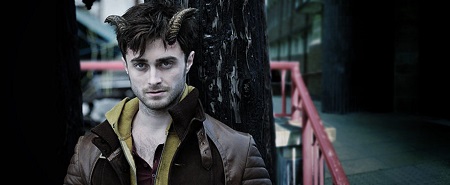 I wanted to like Horns so much. I’ve enjoyed writer/director Alexandre Aja’s pulpy genre output since 2003’s French horror flick High Tension, and enjoyed the hell out of the campy, gore-laden Piranha 3D. Horns looked more ambitious than those films, though, still working the genre tropes that Aja uses so well but expanding into a broader, more fantastical realm, adapted from Joe Hill’s novel. The trailers looked great, I loved the cast (starring Daniel Radcliffe and featuring Max Minghella, Juno Temple, and Joe Anderson), and with a premiere at last year’s Toronto International Film Festival, it seemed like Horns might be something a little bit special.
I wanted to like Horns so much. I’ve enjoyed writer/director Alexandre Aja’s pulpy genre output since 2003’s French horror flick High Tension, and enjoyed the hell out of the campy, gore-laden Piranha 3D. Horns looked more ambitious than those films, though, still working the genre tropes that Aja uses so well but expanding into a broader, more fantastical realm, adapted from Joe Hill’s novel. The trailers looked great, I loved the cast (starring Daniel Radcliffe and featuring Max Minghella, Juno Temple, and Joe Anderson), and with a premiere at last year’s Toronto International Film Festival, it seemed like Horns might be something a little bit special.
Haha, no. It’s not. At best Horns is a messy, slightly dumb, piece of magical realism that never feels either magical or real. There are parts of it that work great, but a lot of it fails so spectacularly that it drags the good parts down, too. It’s like owning a junker Ferrari—yeah, it’s a Ferrari but it’s a piece of crap that doesn’t run, too. It’s not that there’s no value to Horns, it’s just that what value there is, is severely handicapped by a dumb script.
Horns is about Ig Perrish and his charming, earth-goddessy girlfriend Merrin. (Defying expectations, no one else in the movie has a stupid name.) In the opening scene we see Ig and Merrin frolicking in a tree house in the picturesque forests of the Pacific Northwest. The lighting is soft and buttery, Merrin is beautiful, Ig pale and romantic. It’s idyllic, and a good opening title sequences bleeds that golden light away into a flatter, darker scene in which we learn that Merrin is dead and Ig stands accused of her brutal murder. Upon awakening, Ig discovers small horns protruding from his forehead.
First, the good. Ig’s horns come with rules attached, and he spends the first half of the movie learning how they work. I like it any time a movie acknowledges that the sudden acquisition of power entails a learning period, so I enjoyed that. Also, the rules of the horns are logical—within the bounds of this alternate reality—and the movie obeys those rules throughout. Also good—Aja put some thought into how this would work. Why Ig has the horns is mysterious, but he learns that people can see them though they don’t remember them, and suddenly people want to tell Ig their deepest darkest secrets, and he can also compel them into action. As he embraces the horns, these powers grow stronger.
The look of the movie is great, with strong blues, greens, and blacks dominating the color palette, which sets off Radcliffe’s pale skin and the signature yellow/red of his wardrobe nicely. It’s a lovely film to look at, and even when the budget clearly constrains the SFX late in the third act, Aja and art director Jeremy Stanbridge (Twilight: Eclipse and Breaking Dawn 2) manage to integrate practical makeup and prosthetics convincingly enough. Robin Coudert’s (Maniac) score is also a positive, and the film effects a grungy moodiness and rainy romanticism well enough. Aja does a lot right with the physical makeup of this film.
It’s just that people say really stupid things. In that first scene this exchange happens:
Ig: I’ll love you for the rest of my life.
Merrin: Just love me for the rest of mine.
That’s gross, and horrible, and no one should ever say that, not least because that exact exchange was also used in the terrible angel movie Michael starring John Travolta. There’s clunky dialogue like that all over the place. I don’t know if Aja was being faithful to Hill’s book or what, but he should have better instincts as a writer than to adhere to such shitty dialogue. Also, the whodunit of Merrin’s murder is easily deciphered halfway through the movie, so there’s no narrative tension to Ig’s big revenge plot. A really fantastic idea is utterly hamstrung by cliché.
The best part of Horns is the middle, when Ig embraces the horns and the power they give him and begins exacting revenge on the small-minded and selfish townspeople—including his own brother—who are persecuting him. If the movie had been about this guy, wrongly accused of a brutal crime, becoming a twenty-first century Lucifer, it would’ve been awesome. Instead it settles for the middle-of-the-road sap territory, sacrificing that higher conceit on the altar of a really hackneyed thwarted love story.


